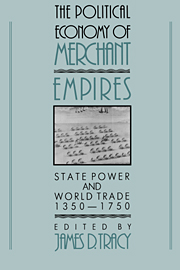Book contents
- Frontmatter
- Contents
- Acknowledgments
- Introduction
- 1 Institutions, Transaction Costs, and the Rise of Merchant Empires
- 2 Merchants and States
- 3 The Rise of Merchant Empires, 1400–1700: A European Counterpoint
- 4 Europe and the Wider World, 1500–1700: The Military Balance
- 5 The Pirate and the Emperor: Power and the Law on the Seas, 1450–1850
- 6 Transport Costs and Long-Range Trade, 1300–1800: Was There a European “Transport Revolution” in the Early Modern Era?
- 7 Transaction Costs: A Note on Merchant Credit and the Organization of Private Trade
- 8 Evolution of Empire: The Portuguese in the Indian Ocean During the Sixteenth Century
- 9 Comparing the Tokagawa Shogunate with Hapsburg Spain: Two Silver-Based Empires in a Global Setting
- 10 Colonies as Mercantile Investments: The Luso-Brazilian Empire, 1500–1808
- 11 Reflections on the Organizing Principle of Premodern Trade
- Selected Bibliography of Secondary Works
- Index
6 - Transport Costs and Long-Range Trade, 1300–1800: Was There a European “Transport Revolution” in the Early Modern Era?
Published online by Cambridge University Press: 25 March 2010
- Frontmatter
- Contents
- Acknowledgments
- Introduction
- 1 Institutions, Transaction Costs, and the Rise of Merchant Empires
- 2 Merchants and States
- 3 The Rise of Merchant Empires, 1400–1700: A European Counterpoint
- 4 Europe and the Wider World, 1500–1700: The Military Balance
- 5 The Pirate and the Emperor: Power and the Law on the Seas, 1450–1850
- 6 Transport Costs and Long-Range Trade, 1300–1800: Was There a European “Transport Revolution” in the Early Modern Era?
- 7 Transaction Costs: A Note on Merchant Credit and the Organization of Private Trade
- 8 Evolution of Empire: The Portuguese in the Indian Ocean During the Sixteenth Century
- 9 Comparing the Tokagawa Shogunate with Hapsburg Spain: Two Silver-Based Empires in a Global Setting
- 10 Colonies as Mercantile Investments: The Luso-Brazilian Empire, 1500–1808
- 11 Reflections on the Organizing Principle of Premodern Trade
- Selected Bibliography of Secondary Works
- Index
Summary
INTRODUCTION
It is now a commonplace among economic historians to argue that long-distance trade has been overemphasized by students of the early modern period. The international economy was poorly integrated before 1800, and trade between the numerous units (however defined) participating in long-range commerce was rarely a central dynamic in any of them. Some scholars even deny the utility of the concept of a world economy until more recent times, insisting that we have been misled by the relatively ample documentation generated by international, transoceanic, cross-cultural exchange to exaggerate its importance. We would be better advised, the argument runs, to focus on the internal organization of smaller-scale regional economic units, for it is in the everyday lives of ordinary people far removed from the glamor of the high seas and the counting houses of the great merchants that the roots of modern economic growth must be sought.
That message has much to recommend it, but it too can be exaggerated. It is a mistake to argue that long-range trade and long-range trade alone drove the process of economic modernization, provided the capital and the markets necessary to industrialization. But it is also an error to dismiss long-distance trade altogether and to claim that a purely “internal” view is adequate to economic history. It is a mistake to argue for a perfectly integrated world market by 1800, but no one can deny that the enormous increase in long-range trade during the past four centuries had produced a good deal more integration than had been the case in 1400. Long-distance trade must have its due.
- Type
- Chapter
- Information
- The Political Economy of Merchant EmpiresState Power and World Trade, 1350–1750, pp. 228 - 275Publisher: Cambridge University PressPrint publication year: 1991
- 30
- Cited by



